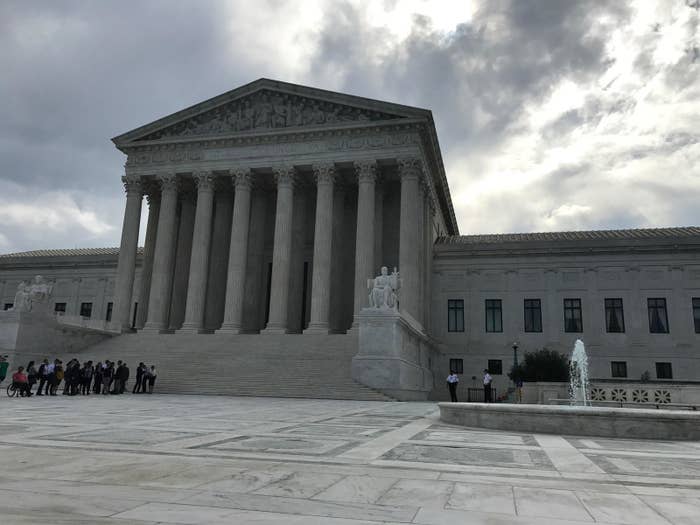
The Supreme Court ruled in favor of free speech in two cases where governments, the court held, had impermissibly limited speech in order to protect against disparagement against certain groups and reduce the risk of registered sex offenders contacting minors, respectively.
No justices dissented from either of the decisions, although there were disagreements about how the First Amendment should be applied in both cases — and how the decisions should affect future cases.
The first case involved the closely watched dispute over whether the Patent and Trademark Office can deny a trademark to an applicant because it violated the trademark law's "disparagement clause" — which bars granting trademarks to those that would "disparage" any "persons, living or dead."
The court ruled that, under the Free Speech Clause of the First Amendment, it can't.
In the case before the justices, a band — The Slants — had their trademark application denied because the federal office decided the name was disparaging to people of Asian descent — despite the fact that members of the band are Asian-Americans. Justices heard arguments in the case in January, before Justice Neil Gorsuch joined the court, and he did not participate in Monday's decision.
A similar case against the trademark office's move to cancel the Washington Redskins football team's trademark was not before the justices, but the decision against the disparagement clause means the team can keep its trademark.
The eight justices deciding the case were unanimous as to the decision that, as Justice Samuel Alito wrote for the court, "Trademarks are private, not government, speech," and that the disparagement clause violated the First Amendment.
How the court reached that decision, however, split the court — leaving it without a majority as to how the case is resolved (and how lower courts should apply it to other circumstances).
Alito — joined by Chief Justice John Roberts and Justices Clarence Thomas and Stephen Breyer — found that government cannot ban speech "because the ideas themselves are offensive to some of their hearers" and the disparagement clause "cannot withstand even" the relaxed scrutiny the court has assigned to reviewing regulations of commercial speech. (Thomas wrote separately to note that he continues to believe commercial speech restrictions should be subjected to strict scrutiny.) Justice Anthony Kennedy — joined by Justices Ruth Bader Ginsburg, Sonia Sotomayor, and Elena Kagan — would decide the case on the grounds that the restriction constituted an impermissible viewpoint-based restriction.
If any majority reasoning could immediately be gleaned from the two 4-justice decisions, it simply is a reaffirmation, as Kennedy wrote citing Alito's decision, that "the Court's cases ... prohibit[] the government from justifying a First Amendment burden by pointing to the offensiveness of the speech to be suppressed."
In the second case, the court ruled that North Carolina's law barring registered sex offenders from accessing social networking sites that allow minors to become members or set up personal pages violated the Free Speech Clause of the First Amendment — as applied to the states through the Fourteenth Amendment's due process clause.
At the February arguments in the case, North Carolina's lawyer pointed to a 1992 Supreme Court case — Burson v. Freeman, in which the court upheld a 100-foot buffer zone barring political activity outside polling places — as the basis for its argument that North Carolina's law should be upheld.
"I think that does not help you. At all," Kennedy said in response, adding that if Burson is the state's only case supporting its argument, "[Y]ou lose."
On Monday, Kennedy wrote the court's opinion, highlighting the state's reliance on Burson and noting, "That case gives little or no support to the state," explaining that the polling place-barrier was "a limited restriction" aimed at "protect[ing] another fundamental right — the right to vote" and that the restriction is "far less onerous" than North Carolina's law at issue here.
In large part, the court's decision was an affirmation of the central place that the internet — and social networking sites specifically — play in people's lives today.
Citing the court's earlier cases protecting speech in public squares or parks as "a quintessential forum for the exercise of First Amendment rights," Kennedy noted that it might have been difficult, "in a spatial sense," to determine those most important places.
"[T]oday," he wrote in contrast, "the answer is clear. It is cyberspace—the 'vast democratic forums of the Internet' in general ... and social media in particular."
Analyzing the law under the standard that it cannot "burden substantially more
speech than is necessary to further the government’s legitimate interests," Kennedy — joined by Ginsburg, Breyer, Sotomayor, and Kagan — struck down the law because, he wrote, "the statute here enacts a prohibition unprecedented in the scope of First Amendment speech it burdens."
As in the first case, Alito agreed with Kennedy's ultimate decision striking down the law "because of [it]’s extraordinary breadth," but he expressed concern with the "undisciplined dicta" — language unnecessary to the court's holding — in Kennedy's decision. Alito was joined in his opinion concurring in the court's judgment by Roberts and Thomas.
"The Court is unable to resist musings that seem to equate the entirety of the internet with public streets and parks," Alito wrote, noting that the decision could lead some to believe that states "are largely powerless" to place any web site restrictions on "even the most dangerous sexual predators." (This, notwithstanding a note in Kennedy's opinion for the court that "this opinion should not be interpreted as barring a State from enacting more specific laws than the one at issue.")

